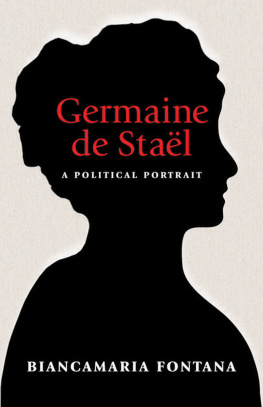TEN YEARS' EXILE;
Or
Memoirs of That Interesting Period of the Life of the Baroness De Stael-Holstein,
Written by Herself, during the Years 1810, 1811, 1812, and 1813, and Now First Published from the Original Manuscript, by Her Son.
Translated from the French
London:
Printed for
Treuttel and Wurtz, Treuttel Jun. and Richter,
Foreign Booksellers to his Royal Highness Prince Leopold of
Saxe-Coberg,
30, Soho Square.
1821
Howlett & Brimmer, Printers, 10, Filth Street, Soho Square.
PREFACE BY THE EDITOR (Augustus, Baron de Stael-Holstein.)
The production which is now submitted to the reader, is not a complete work, and ought not to be criticized as such. It consists of Fragments of her Memoirs, which my mother had intended to complete at her leisure, and which would have probably undergone alterations, of the nature of which I am ignorant, if a longer life had been allowed her to revise and finish them.
This reflection was sufficient to make me examine most scrupulously if I was authorized to give them publicity. The fear of any sort of responsibility cannot be present to the mind, when our dearest affections are in question; but the heart is agitated by a painful anxiety when we are left to guess at those wishes, the declaration of which would have been a sacred and invariable rule. Nevertheless, after having seriously reflected on what duty required of me, I am satisfied that I have fulfilled my mother's intentions, in engaging to leave out in this edition of her works*, no production susceptible of being printed. My fidelity in adhering to this engagement gives me the right of disavowing beforehand, all which at any future period, persons might pretend to add to this collection, which, I repeat, contains every thing, of which my mother had not formally forbid the publication.
(* Les Oeuvres completes de Madame la Baronne de Stael, publiees par son Fils. Precedees d'une notice sur le caractere et les ecrits de Madame de Stael, par Madame Necker de Saussure. Paris, 17 vols. 8vo. and 17 vols. in 12mo.)
The title of TEN YEARS' EXILE, is that of which the authoress herself made choice; I have deemed it proper to retain it, although the work, being unfinished, comprises only a period of seven years. The narrative begins in 1800, two years previous to my mother's first exile, and stops at 1804, after the death of M. Necker. It recommences in 1810, and breaks off abruptly at her arrival in Sweden, in the autumn of 1812. Between the first and second part of these Memoirs there is therefore an interval of nearly six years. An explanation of this will be found in a faithful statement of the manner in which they were composed.
I will not anticipate my mother's narrative of the persecution to which she was subjected during the imperial government: that persecution, equally mean and cruel, forms the subject of the present publication, the interest of which I should only weaken. It will be sufficient for me to remind the reader, that after having exiled her from Paris, and subsequently sent her out of France, after having suppressed her work on Germany with the most arbitrary caprice, and made it impossible for her to publish anything, even on subjects wholly unconnected with politics; that government went so far as to make her almost a prisoner in her own residence, to forbid her all kind of travelling, and to deprive her of the pleasures of society and the consolations of friendship. It was while she was in this situation that my mother began her Memoirs, and one may readily conceive what must have been at that time the disposition of her mind.
During the composition of the work, the hope of one day giving it to the world scarcely presented itself in the most distant futurity. Europe was still bent to that degree under the yoke of Napoleon, that no independent voice could make itself be heard: on the Continent the press was completely chained, and the most rigorous measures excluded every work printed in England. My mother thought less, therefore, of composing a book, than of preserving the traces of her recollections and ideas. Along with the narrative of circumstances personal to herself, she incorporated with it various reflections which were suggested to her, from the beginning of Bonaparte's power, by the state of France, and the progress of events. But if the printing such a work would at that time have been an act of unheard of temerity, the mere act of writing it required a great deal of both courage and prudence, particularly in the position in which she was placed. My mother had every reason to believe that all her movements were narrowly watched by the police: the prefect who had replaced M. de Barante at Geneva, pretended to be acquainted with every thing that passed in her house, and the least pretence would have been sufficient to induce them to possess themselves of her papers. She was obliged therefore, to take the greatest precautions. Scarcely had she written a few pages, when she made one of her most intimate friends transcribe them, taking care to substitute for the proper names those of persons taken from the history of the English Revolution. Under this disguise she carried off her manuscript, when in 1812 she determined to withdraw herself by flight from the rigors of a constantly increasing persecution.
On her arrival in Sweden, after having travelled through Russia, and narrowly escaped the French armies advancing on Moscow, my mother employed herself in copying out fairly the first part of her Memoirs, which, as I have already mentioned, goes no farther than 1804. But prior to continuing them in the order of time, she wished to take advantage of the moment, during which her recollections were still strong, to give a narrative of the remarkable circumstances of her flight, and of the persecution which had rendered that step in a manner a duty. She resumed, therefore, the history of her life at the year 1810, the epoch of the suppression of her work on Germany, and continued it up to her arrival at Stockholm in 1812: from that was suggested the title of Ten Years' Exile. This explains also, why, in speaking of the imperial government, my mother expresses herself sometimes as living under its power, and at other times, as having escaped from it.
Finally, after she had conceived the plan of her Considerations on the French Revolution, she extracted from the first part of Ten Years Exile, the historical passages and general reflections which entered into her new design, reserving the individual details for the period when she calculated on finishing the memoirs of her life, and when she flattered herself with being able to name all the persons of whom she had received generous proofs of friendship, without being afraid of compromising them by the expressions of her gratitude.
The manuscript confided to my charge consisted therefore of two distinct parts: the first, the perusal of which necessarily offered less interest, contained several passages already incorporated in the Considerations on the French Revolution; the other formed a sort of journal, of which no part was yet known to the public. I have followed the plan traced by my mother, by striking out of the first part of the manuscript, all the passages which, with some modifications, have already found a place in her great political work. To this my labour as editor has been confined, and I have not allowed myself to make the slightest addition.
The second part I deliver to the public exactly as I found it, without the least alteration, and I have scarcely felt myself entitled to make slight corrections of the style, so important did it appear to me to preserve in this sketch the entire vividness of its original character. A perusal of the opinions which she pronounces upon the political conduct of Russia, will satisfy every one of my scrupulous respect for my mother's manuscript; but without taking into account the influence of gratitude on elevated minds, the reader will not fail to recollect, that at that time the sovereign of Russia was fighting in the cause of liberty and independence. Was it possible to foresee that so few years would elapse before the immense forces of that empire should become the instruments of the oppression of unhappy Europe?





